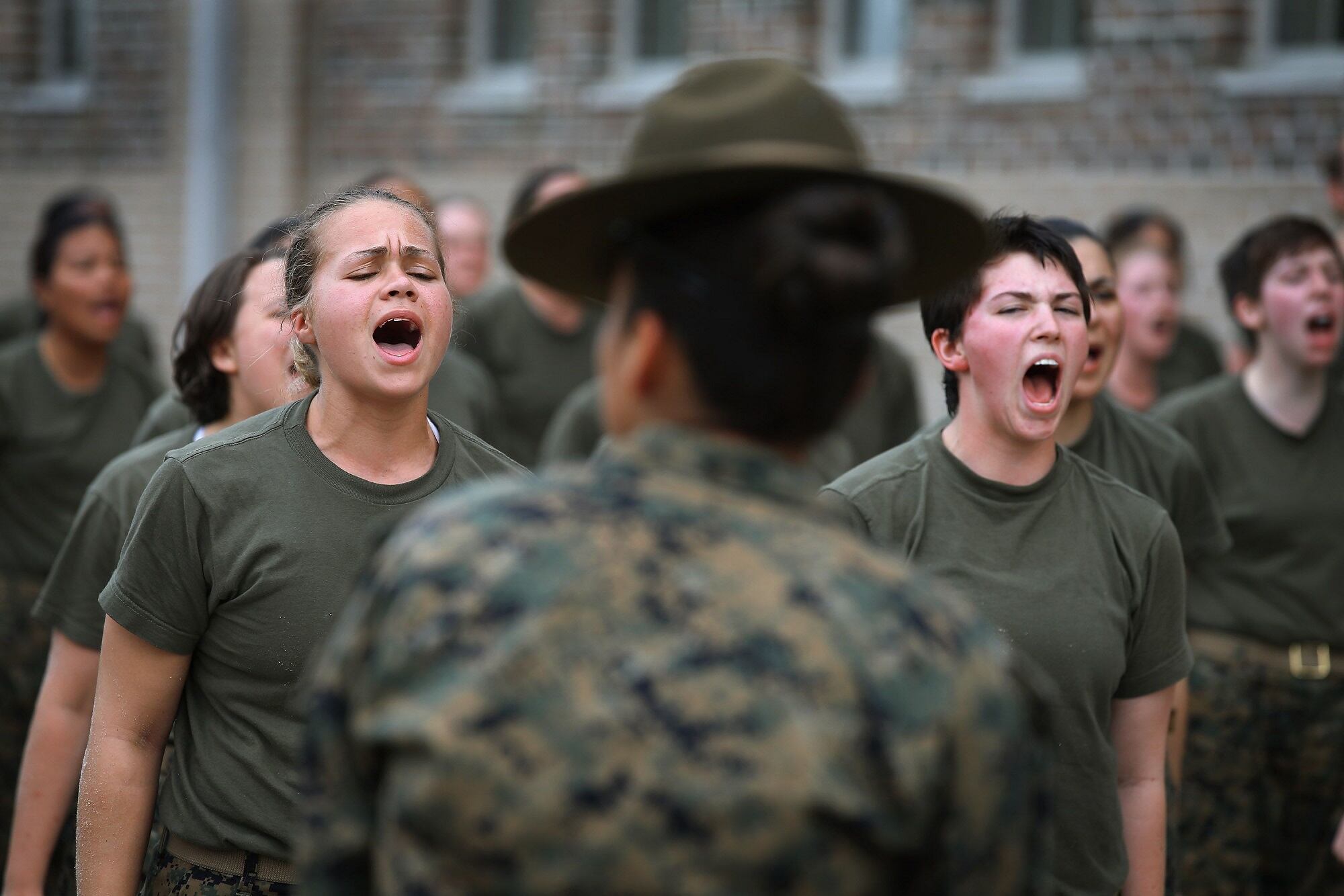The Marine Corps might close the doors on its iconic Marine Corps Recruit Depot Parris Island, South Carolina, and hilly Marine Corps Recruit Depot San Diego.
One plan under consideration would shift Marine Corps boot camp to a third location specifically built for modern day training with gender-integrated platoons, according to reporting from Military.com.
The 2020 National Defense Authorization Act required the Marine Corps to gender-integrate recruit training at the platoon level at both boot camps ― a task the Marine Corps simply does not have the infrastructure for, Marine Corps Commandant Gen. David Berger said Thursday.
“Nothing the way we’re organized right now lends itself to integrated recruit training,” Berger said at Defense One’s state of the Marine Corps event.
RELATED

“We have to get to a place where on both coasts or at a third location, or whatever we end up with that every recruit male, female, there’s all there’s male and female around,” he added.
The Corps is still too early in the planning process to give details on what exactly is being considered, a Marine Corps spokesperson told Marine Corps Times.
“We are exploring all options to accomplish this integration, while also realizing the vision of the 38th Commandant’s Planning Guidance related to modernization of our training facilities to ensure our Marines remain capable, relevant and lethal in the future,” Capt. Joseph Butterfield, a spokesman for Headquarters Marine Corps, said in a Friday email. “At this time, any remarks on courses of action are premature as we are simply exploring all options."
The Marines have been on Parris Island, South Carolina, since 1891 and have been training new recruits on the island since 1915, while Marine Corps Recruit Depot San Diego starting “making Marines” in 1923.
In the past century, hundreds of thousands of Marines have received their initial introduction to the Corps on Parris Island, South Carolina, but age, technological advancement and the threats of climate change may lead the Corps to choose a third location for initial training.
“Due to a variety of limitations, neither Marine Corps Recruit Depots Parris Island nor San Diego are currently able to optimally train recruits in an integrated environment,” Butterfield said.
Parris Island — a small island off the southern coast of South Carolina — faces an increased risk of flooding and may soon see six times more “black flag” days that reduce the training recruits can perform, according to a study by the Union of Concerned Scientists.
In a 2018 Senate Armed Services hearing Gen. Glenn Walters, then the assistant commandant of the Marine Corps, testified that Parris Island, South Carolina, was the Marine Corps' “most critical vulnerability," concluding that the Marine Corps will eventually have to build a seawall on the base to fight against flooding.
“We are a waterfront organization, also we have come to the conclusion that we’re not going to turn the tide,” Walters said.
While boot camp on the West Coast faces fewer issues from flooding, the base must take into consideration its vulnerability to California wildfires, which may cause power outages or even threaten the recruits as they complete the portion of their training conducted on Camp Pendleton, California, John Conger, director of the Center for Climate and Security told Marine Corps Times.
“The electric lines that transverse California are significantly impacted by wildfires, they’re significantly impacted when they have to shut the power down because it’s too hot,” Conger said.
“Those power fluctuations affect the base, so you have to have energy resilience plans ... that’s going to cost its own money,” he added.
Once the Marine Corps starts doing the math on how much it will cost to upgrade for integrated training, climate change protections and just general modernization, it could start make sense to just build a third more efficient location to train all Marines.
“If you have to update a lot anyway, do you save manpower, resources and personnel by just combining the two into one?” Maj. Eric Flanagan, Berger’s spokesman, told Military.com.
Conger, who served as assistant secretary of defense for energy, installations and environment during President Barack Obama’s time in office, said the Marine Corps is unlikely to acquire new land to build a base on, but may add on to an existing Marine Corps or even Army installation.
“They can build a bunch of infrastructure, they can leverage infrastructure at other bases,” Conger said.
“Marines do training right now at Fort Leonard Wood (Missouri)... they could leverage the Marine foot print there,” Conger added.
The Marine Corps currently holds several military occupational specialty schools on Fort Leonard Wood, including its motor vehicle operator course and its military police school.
“It is almost like a Marine base within an Army base," Conger added.




